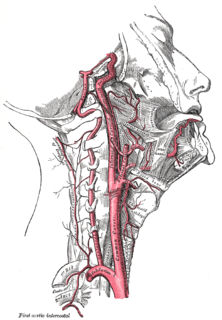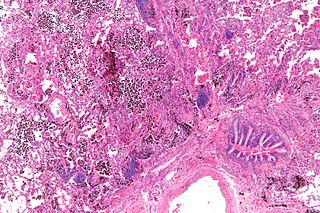
Alfredo James Pacino is an American actor and filmmaker. In a career spanning over five decades, he has received many awards and nominations, including an Academy Award, two Tony Awards, and two Primetime Emmy Awards. He is one of the few performers to have received the Triple Crown of Acting. He has also been honored with the AFI Life Achievement Award, the Cecil B. DeMille Award, and the National Medal of Arts.

Asphyxia or asphyxiation is a condition of deficient supply of oxygen to the body that arises from abnormal breathing. An example of asphyxia is choking. Asphyxia causes generalized hypoxia, which affects primarily the tissues and organs. There are many circumstances that can induce asphyxia, all of which are characterized by an inability of an individual to acquire sufficient oxygen through breathing for an extended period of time. Asphyxia can cause coma or death.

Fargo is a 1996 dark comedy crime drama film written, produced and directed by Joel and Ethan Coen. Frances McDormand stars as Marge Gunderson, a pregnant Minnesota police chief investigating roadside homicides that ensue after a desperate car salesman hires two criminals to kidnap his wife in order to extort a hefty ransom from his wealthy father-in-law. The film was an international co-production between the United States and the United Kingdom.

The Color of Money is a 1986 American sports drama film directed by Martin Scorsese and was released by Touchstone Pictures. The film was created from a screenplay by Richard Price, based on the 1984 novel of the same name by Walter Tevis. The film stars Paul Newman and Tom Cruise, with Mary Elizabeth Mastrantonio, Helen Shaver, and John Turturro in supporting roles. It features an original score by Robbie Robertson.

Positional asphyxia, also known as postural asphyxia, is a form of asphyxia which occurs when someone's position prevents the person from breathing adequately. Positional asphyxia also may be a result of the policing technique, "prone restraint" used by police, corrections, military, or health care staff. People may die from positional asphyxia accidentally, when the mouth and nose are blocked, or where the chest may be unable to fully expand.

Strangling is compression of the neck that may lead to unconsciousness or death by causing an increasingly hypoxic state in the brain. Fatal strangling typically occurs in cases of violence, accidents, and is one of two main ways that hanging causes death.

Blackadder's Christmas Carol, a one-off episode of Blackadder, is a parody of Charles Dickens' 1843 novella A Christmas Carol. It is set between Blackadder the Third (1987) and Blackadder Goes Forth (1989), and is narrated by Hugh Laurie. Produced by the BBC, it was first broadcast on BBC1 on 23 December 1988.
Erotic asphyxiation is the intentional restriction of oxygen to the brain for the purposes of sexual arousal. The term autoerotic asphyxiation is used when the act is done by a person to themselves. Colloquially, a person engaging in the activity is sometimes called a gasper.
Perinatal asphyxia is the medical condition resulting from deprivation of oxygen to a newborn infant that lasts long enough during the birth process to cause physical harm, usually to the brain. It is also the inability to establish and sustain adequate or spontaneous respiration upon delivery of the newborn. It remains a serious condition which causes significant mortality and morbidity. It is an emergency condition and requires adequate and quick resuscitation measures.Perinatal asphyxia is also an oxygen deficit from the 28th week of gestation to the first seven days following delivery. It is also an insult to the fetus or newborn due to lack of oxygen or lack of perfusion to various organs and may be associated with a lack of ventilation. In accordance with WHO, perinatal asphyxia is characterised by- Profound metabolic acidosis, with a PH <7.20 on umbilical cord arterial blood sample, Persistence of an APGAR score of 3 at the 5th minute, Clinical neurologic sequelae in the immediate neonatal period,Evidence of multiorgan system dysfunction in the immediate neonatal period. Hypoxic damage can occur to most of the infant's organs, but brain damage is of most concern and perhaps the least likely to quickly or completely heal. In more pronounced cases, an infant will survive, but with damage to the brain manifested as either mental, such as developmental delay or intellectual disability, or physical, such as spasticity.

Pulmonary hemorrhage is an acute bleeding from the lung, from the upper respiratory tract and the trachea, and the alveoli. When evident clinically, the condition is usually massive. The onset of pulmonary hemorrhage is characterized by cough productive of blood (hemoptysis) and worsening of oxygenation leading to cyanosis. Treatment should be immediate and should include tracheal suction, oxygen, positive pressure ventilation, and correction of underlying abnormalities. A blood transfusion may be necessary.

Intrauterine hypoxia occurs when the fetus is deprived of an adequate supply of oxygen. It may be due to a variety of reasons such as prolapse or occlusion of the umbilical cord, placental infarction and maternal smoking. Intrauterine growth restriction may cause or be the result of hypoxia. Intrauterine hypoxia can cause cellular damage that occurs within the central nervous system. This results in an increased mortality rate, including an increased risk of sudden infant death syndrome (SIDS). Oxygen deprivation in the fetus and neonate have been implicated as either a primary or as a contributing risk factor in numerous neurological and neuropsychiatric disorders such as epilepsy, attention deficit hyperactivity disorder, eating disorders and cerebral palsy.
Inert gas asphyxiation is a form of asphyxiation which results from breathing a physiologically inert gas in the absence of oxygen, or a low amount of oxygen, rather than atmospheric air. Examples of physiologically inert gases, which have caused accidental or deliberate death by this mechanism, are argon, helium, nitrogen and methane. The term "physiologically inert" is used to indicate a gas which has no toxic or anesthetic properties and does not act upon the heart or hemoglobin. Instead, the gas acts as a simple diluent to reduce oxygen concentration in inspired gas and blood to dangerously low levels, thereby eventually depriving all cells in the body of oxygen.
Traumatic asphyxia, or Perthes's syndrome, is a medical emergency caused by an intense compression of the thoracic cavity, causing venous back-flow from the right side of the heart into the veins of the neck and the brain.
Optimum Wound Profile were an industrial metal band from Ipswich, England, active between the years 1991-1996. Combining elements of metal, crust punk, and sampling/programming technologies they released three albums and toured across Europe.

Sushant Singh Rajput was an Indian actor who is best known for his work in Hindi cinema. He starred in a number of commercially successful Bollywood films such as M.S. Dhoni: The Untold Story (2016), Kedarnath (2018) and Chhichhore (2019). Due to his contribution to the film industry, he received a Screen Award and was nominated for the Filmfare Awards on two occasions.

Are You the One?, sometimes abbreviated as AYTO?, is an American reality television series on MTV, in which young singles try to find love. A group of men and women are secretly paired into couples by producers, via a matchmaking algorithm. Then, while living together, the contestants try to identify all of these "perfect matches." If they succeed, the entire group shares a prize of up to $1 million. All couples in the first seven seasons were male-female, while in the eighth season a contestant's match could be someone of any gender. Over the course of each season, the contestants go on dates with partners determined by competitions, and have the opportunity to learn in the "truth booth" if a given couple is a correct match. Once the truth booth confirms a perfect match, that couple will go to the honeymoon suite and will automatically be paired up for the remainder of the match ceremonies. At the end of each episode, the contestants pair up in a "matching ceremony" and learn how many perfect matches they have, but not which matches are correct. From season 3 onward, the prize was reduced any time that the house failed to identify any matches other than those already confirmed via the truth booth.

Navid Mohammadzadeh is an Iranian actor.

Asphyxia is a 2017 Iranian neo-noir film written, produced and directed by Fereydoun Jeyrani and starring Navid Mohammadzadeh, Elnaz Shakerdoust, Mahaya Petrosian and Pardis Ahmadieh.
Alexandra Flores was murdered by David Santiago Renteria on November 18-19, 2001 in El Paso, Texas, after being kidnapped. She was last with her parents in a local Walmart. Flores's body was found naked and slightly burnt by employees of a doctor's office, 18 miles away from the place of abduction.












